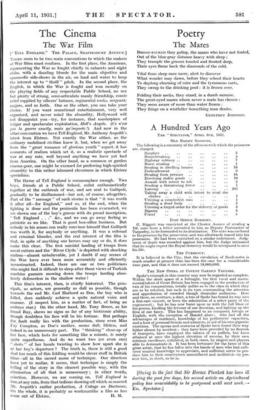A Hundred Years Ago
The following is a summary of the offences with which the prisoners are charged.
Burglary .. 3 Housebreaking .. 4 Highway robbery . .
Horse stealing . . • •
1
Stealing in dwelling houses 16 Embezzlement . . . . 3 Stealing from persons .. 44 Receiving stolen goods .. • • 10 Assault with intent to rob 2 Sending a threatening letter 1 Larceny . . .. 202 Taking away a child with intent to steal the clothes . . . .
1
Uttering a counterfeit coin . . 1 Stealing a dead body . 2 Uttering a forged order for the delivery of goods 2 Bigamy .. . 4 Fraud .. .. .. .. 5
POST OFFICE ROBBERY.
G. Higgott was convicted at the Chester Assizes of stealing a 101. note from a letter intrusted to him as Deputy Postmaster of Tarporley, to be forwarded to its destination. The note was enclosed in his presence by the prosecutor, and was afterwards traced into his possession. He had been convicted on a similar indictment. Judg- ment of death was recorded against him, but the Judge intimated that he might expect the Royal clemency would be interposed to save his life.
THE CURRENCY.
It is believed in the City, that the circulation of Bank-notes is much smaller at present than has been the case for a considerable time past, and that it does not exceed 18,000,0001.
THE NEW OPERA AT COVENT GARDEN THEATRE.
Spohr's triumph in this country may now be regarded as complete. Within the short space of a fortnight, the first vocal and instru- mental talent of Great Britain has been engaged in the production of two of his compositions, totally unlike as to the class to which they are to be referred, but each in its turn commanding the attention and approbation of crowded though diasimil.ar audiences. Here and there, an overture, a duet, a trio of Spohr has found its way into a first-rate concert, or been the admiration of a select party of the cognoscenti ; but he has now burst upon us with the full blaze of his genius, kindling the fervour of our devotion, and lighting up tho fires of our fancy. This has happened to no composer, foreign or English, with the exception of Handel alone ; who had all the advantages of residence, knowledge of his performers' capacities, and a host of personal friends and admirers, in aid of his own gigantic exertions. The operas and oratorios of Spohr have found their way hither almost by accident ; they have been preceded by no flourish of trumpets, have employed the talents of no puffers, but have attained at once the highest elevation of success, by their own intrinsic excellence, exhibited, in both cases, by singers and players able to demonstrate it. It has been fortunate for the fame of this great artist, that he has fallen into the hands of men who had suffi- cient musical knowledge to appreciate, and sufficient nerve to pro- duce him to their countrymen unmutilated and undiluted—to pre- sent him, in short, as he is.










































 Previous page
Previous page